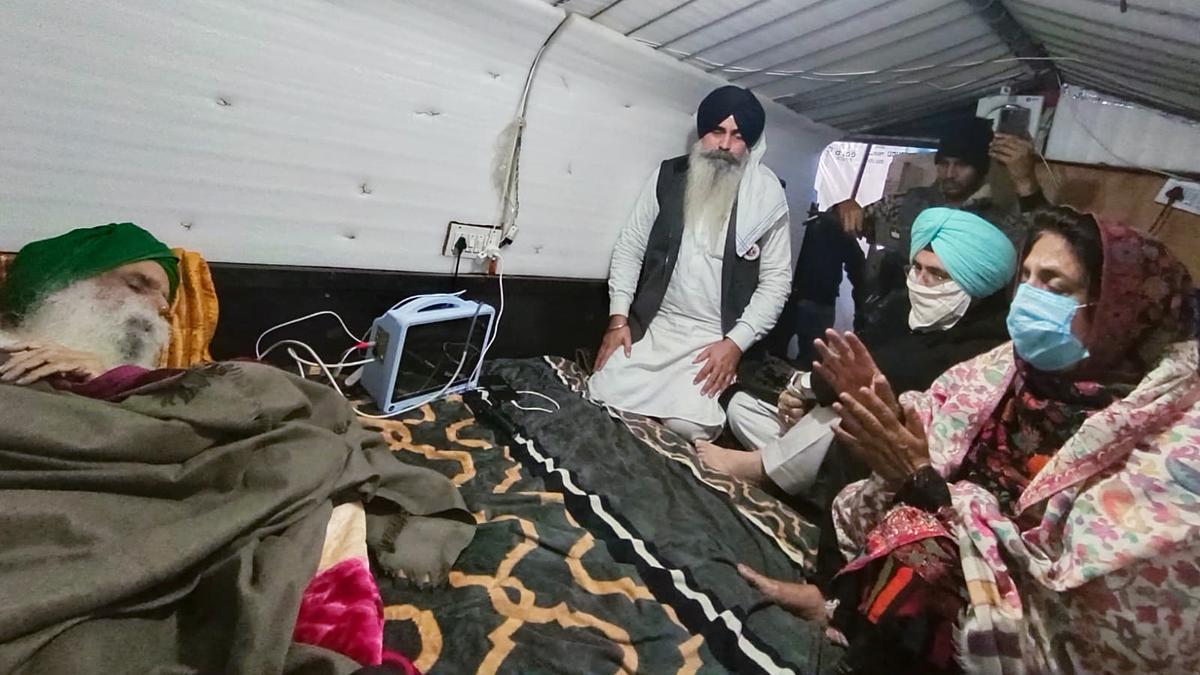 |
|
The ongoing hunger strike by farmer leader Jagjit Singh Dallewal has escalated into a major political and legal crisis, highlighting the deep-seated tensions between the Indian government and protesting farmers. Dallewal's fast-unto-death, initiated on November 26th at the Khanauri border, underscores the farmers' persistent demands for a legal guarantee of Minimum Support Price (MSP) for their crops. The Punjab government, caught in the crossfire, has found itself in a precarious position, facing immense pressure from both the Supreme Court and the agitated farmers. The Supreme Court's intervention underscores the gravity of the situation, emphasizing the urgency of finding a resolution before Dallewal's health deteriorates further. The court's repeated directives to hospitalize Dallewal have been met with resistance, not only from the farmer leader himself but also from the thousands of supporters who have gathered at the protest site, effectively creating a protective cordon around him. This resistance highlights the deep-rooted distrust between the protesting farmers and the government, and the complex political dynamics at play.
The Punjab government's plea to the Supreme Court emphasizes the potential for 'collateral damage' should a forceful evacuation of Dallewal be attempted. The sheer number of protestors – estimated at 3,000 – and their organized resistance, using tractor trolleys to barricade the area, presents a significant challenge for law enforcement. The Punjab Advocate General's description of a multi-layered security system established by the protestors paints a picture of a highly organized and determined group, making a forceful intervention a risky proposition with potentially severe consequences for both the police and the protestors. This predicament underscores the limitations of the State government's authority in the face of determined mass resistance. The court's recognition of this delicate situation led to a postponement of any forceful action, allowing more time for negotiations and alternative solutions.
The Supreme Court's role in this crisis is multifaceted. It acts as a mediator, attempting to bridge the gap between the protesting farmers and the central government, while simultaneously ensuring the safety and well-being of Dallewal. The justices' repeated appeals to the Centre to intervene and defuse the situation highlight the court's belief that only a direct engagement from the central government can provide a meaningful solution. The court's observation that Dallewal may be under 'peer pressure' to resist hospitalization points to the powerful influence of the protest movement on individual decisions, emphasizing the collective nature of the farmers' struggle. The court’s concern, however, is primarily focused on Dallewal’s health and ensuring he receives the necessary medical attention. This underscores the court's role not only as a judicial body but also as a protector of individual rights within a broader socio-political conflict.
The contrasting stances of the Punjab government and the central government further complicate the issue. While Punjab pleads for conciliation and cautions against a forceful approach, the Centre, represented by Solicitor General Tushar Mehta, adopts a more cautious approach, fearing that intervention could worsen the already volatile situation. Mehta’s suggestion that Dallewal is being held 'hostage' and his questioning of the strategic advantage of the Supreme Court's offer of a platform for negotiation points to a deeper political divide and a reluctance on the part of the Centre to directly engage with the farmers' demands. This underscores the potential political ramifications of any concessions made by the central government, and the inherent challenges in navigating this highly sensitive political landscape. The court’s attempt to remain neutral in the exchange between Punjab and the Centre reveals its efforts to prioritize Dallewal’s well-being above the political stalemate. The court emphasizes that its main concern remains Dallewal’s health and that it wishes to remain removed from the political disputes at play.
The situation surrounding Dallewal's hunger strike represents a complex interplay of political, social, and legal factors. The farmers' demands for MSP guarantees highlight a larger issue of agricultural policy and the well-being of India's farming community. The Punjab government's dilemma showcases the challenges faced by state governments in balancing the need to maintain law and order with the need to address the grievances of their constituents. The Supreme Court's role as a mediator highlights the judiciary's crucial role in navigating complex socio-political crises and its commitment to protecting individual rights even amidst widespread political contention. The lack of decisive action from the central government raises concerns about its responsiveness to the concerns of protesting farmers and its willingness to engage in meaningful dialogue. The ongoing stalemate raises serious questions about the long-term consequences for both the farmers and the government, emphasizing the urgent need for a swift and comprehensive resolution that addresses the underlying issues fueling this conflict.
